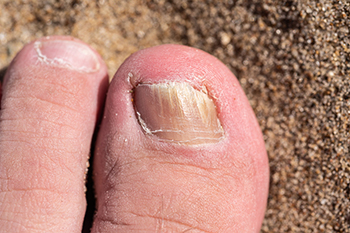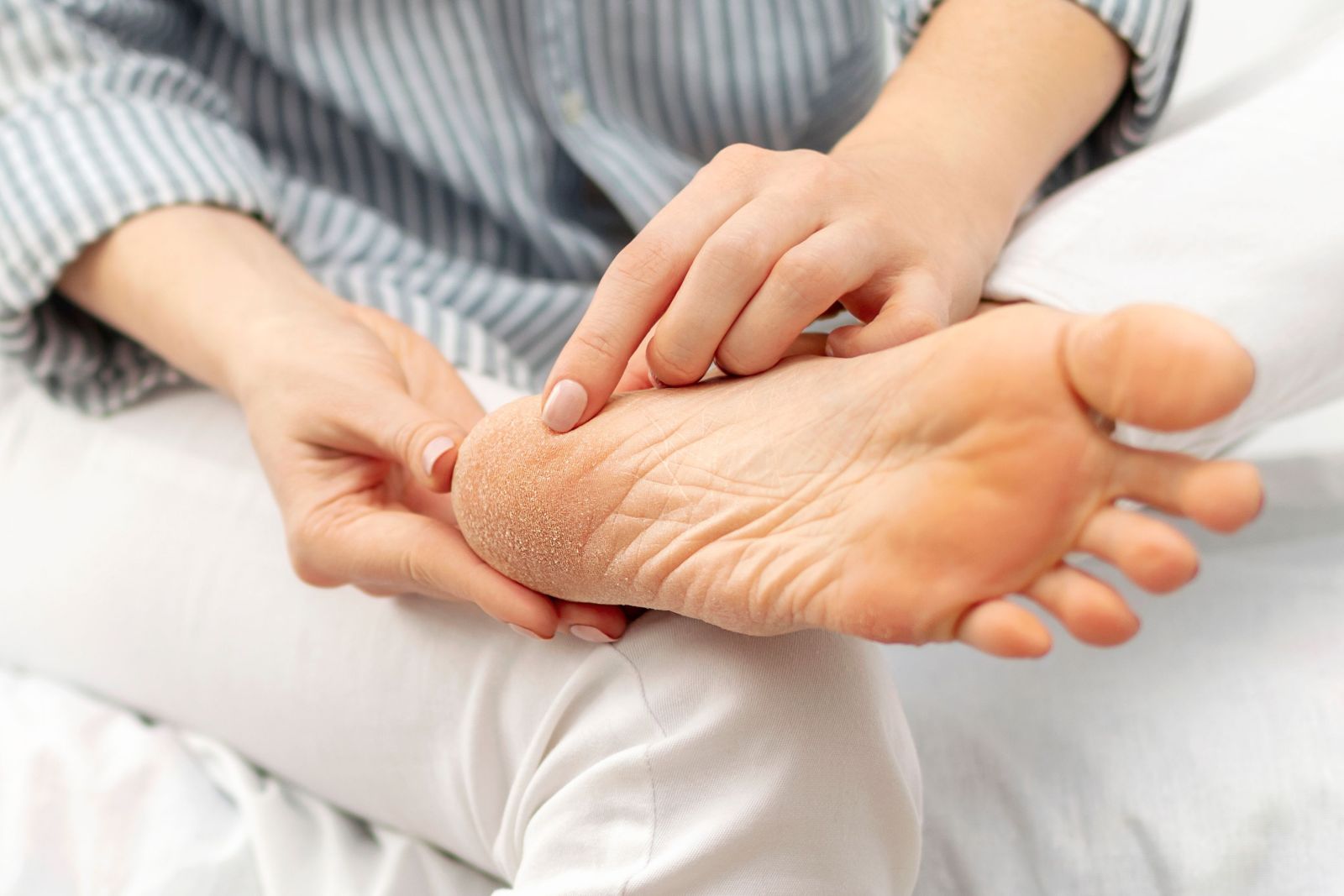Connect With Us
Blog
Items filtered by date: March 2025
Common Foot Injuries in Sports and Who Is Most at Risk

Foot injuries are a frequent problem in many sports, but some athletes face a higher risk than others. Studies show that athletes in gymnastics, cross-country, track and field, and soccer tend to experience foot injuries more often. Both men and women in these sports are affected, but female track and field athletes appear to have a higher rate of injury compared to their male counterparts. The most common foot injuries include bruising of the foot or toes, injuries to the midfoot, plantar fascia strain, turf toe, and fractures of the metatarsal bones. Among these, metatarsal fractures, plantar fascia injuries, midfoot damage, and contusions are considered the most severe and frequent. If you are an athlete involved in high-impact sports, and experience persistent foot pain, it is suggested that you see a podiatrist who can advise with prevention strategies and guide you toward treatment to keep you active and injury-free.
Ankle and foot injuries are common among athletes and in many sports. They can be caused by several problems and may be potentially serious. If you are feeling pain or think you were injured in a sporting event or when exercising, consult with one of our podiatrists from Podiatry Care Specialists. Our doctors will assess your condition and provide you with quality foot and ankle treatment.
Common Injuries
The most common injuries that occur in sporting activities include:
- Achilles Tendonitis
- Achilles Tendon Rupture
- Ankle Sprains
- Broken Foot
- Plantar Fasciitis
- Stress Fractures
- Turf Toe
Symptoms
Symptoms vary depending upon the injury and in some cases, there may be no symptoms at all. However, in most cases, some form of symptom is experienced. Pain, aching, burning, bruising, tenderness, tightness or stiffness, sensation loss, difficulty moving, and swelling are the most common symptoms.
Treatment
Just as symptoms vary depending upon the injury, so do treatment options. A common treatment method is known as the RICE method. This method involves rest, applying ice, compression and elevating the afflicted foot or ankle. If the injury appears to be more serious, surgery might be required, such as arthroscopic or reconstructive surgery. Lastly, rehabilitation or therapy might be needed to gain full functionality in the afflicted area. Any discomfort experienced by an athlete must be evaluated by a licensed, reputable medical professional.
If you have any questions, please feel free to contact our offices located in West Chester, and Broomall, PA . We offer the newest diagnostic and treatment technologies for all your foot care needs.
How High Heels Contribute to Foot Swelling

Wearing high heels for extended periods can lead to swelling due to the unnatural positioning of the feet. High heels shift body weight forward, placing excessive pressure on the toes and the ball of the foot while restricting natural blood circulation. This reduced circulation can cause fluid to accumulate in the feet and ankles, leading to discomfort and swelling. The lack of proper arch support in many high-heeled shoes can further strain the feet and contribute to inflammation. Prolonged use may also weaken the calf muscles and affect the function of the veins, making it more difficult for blood to return to the heart. If you often wear high heels and notice your feet have become swollen, it is suggested that you consult a podiatrist who can treat the underlying cause, and guide you on more appropriate shoes to wear.
High heels have a history of causing foot and ankle problems. If you have any concerns about your feet or ankles, contact one of our podiatrists from Podiatry Care Specialists. Our doctors can provide the care you need to keep you pain-free and on your feet.
Effects of High Heels on the Feet
High heels are popular shoes among women because of their many styles and societal appeal. Despite this, high heels can still cause many health problems if worn too frequently.
Which Parts of My Body Will Be Affected by High Heels?
- Ankle Joints
- Achilles Tendon – May shorten and stiffen with prolonged wear
- Balls of the Feet
- Knees – Heels cause the knees to bend constantly, creating stress on them
- Back – They decrease the spine’s ability to absorb shock, which may lead to back pain. The vertebrae of the lower back may compress.
What Kinds of Foot Problems Can Develop from Wearing High Heels?
- Corns
- Calluses
- Hammertoe
- Bunions
- Morton’s Neuroma
- Plantar Fasciitis
How Can I Still Wear High Heels and Maintain Foot Health?
If you want to wear high heeled shoes, make sure that you are not wearing them every day, as this will help prevent long term physical problems. Try wearing thicker heels as opposed to stilettos to distribute weight more evenly across the feet. Always make sure you are wearing the proper shoes for the right occasion, such as sneakers for exercising. If you walk to work, try carrying your heels with you and changing into them once you arrive at work. Adding inserts to your heels can help cushion your feet and absorb shock. Full foot inserts or metatarsal pads are available.
If you have any questions please feel free to contact our offices located in West Chester, and Broomall, PA . We offer the newest diagnostic and treatment technologies for all your foot and ankle needs.
Facts About Toenail Fungus

Toenail fungus, medically known as onychomycosis, causes discoloration, thickening, and in advanced cases, crumbling of the toenail. Fungal infections thrive in warm, damp environments, making places like swimming pool areas, gym locker rooms, and moist footwear ideal for growth. Symptoms of toenail fungus include nails turning yellow, brown, or green, as well as thickened nails that may become brittle or distorted. A podiatrist can effectively diagnose and manage toenail fungus through prescription antifungal medications or, in severe instances, surgery to remove the infected nail. Early intervention is important to avoid the infection spreading to adjacent toenails or to other people. Patients with diabetes should be especially vigilant because fungal nail infections can lead to sores or complications due to impaired circulation and healing. If you suspect you have a fungal toenail infection, it is suggested that you schedule an appointment with a podiatrist for an exam, diagnosis, and treatment.
If left untreated, toenail fungus may spread to other toenails, skin, or even fingernails. If you suspect you have toenail fungus it is important to seek treatment right away. For more information about treatment, contact one of our podiatrists of Podiatry Care Specialists. Our doctors can provide the care you need to keep you pain-free and on your feet.
Symptoms
- Warped or oddly shaped nails
- Yellowish nails
- Loose/separated nail
- Buildup of bits and pieces of nail fragments under the nail
- Brittle, broken, thickened nail
Treatment
If self-care strategies and over-the-counter medications does not help your fungus, your podiatrist may give you a prescription drug instead. Even if you find relief from your toenail fungus symptoms, you may experience a repeat infection in the future.
Prevention
In order to prevent getting toenail fungus in the future, you should always make sure to wash your feet with soap and water. After washing, it is important to dry your feet thoroughly especially in between the toes. When trimming your toenails, be sure to trim straight across instead of in a rounded shape. It is crucial not to cover up discolored nails with nail polish because that will prevent your nail from being able to “breathe”.
In some cases, surgical procedure may be needed to remove the toenail fungus. Consult with your podiatrist about the best treatment options for your case of toenail fungus.
If you have any questions, please feel free to contact our offices located in West Chester, and Broomall, PA . We offer the newest diagnostic and treatment technologies for all your foot care needs.
Keep Your Feet Healthy So You Can Stay Active
Cracked Heel Care

Cracked heels, a common foot issue, are more frequently reported in women than men, possibly due to footwear choices or hormonal differences affecting skin elasticity. These dry, thickened skin fissures can develop from prolonged standing, wearing open-backed shoes, or exposure to dry environments. Other risk factors include obesity, aging, and medical conditions like diabetes or eczema, which impair skin health. Prevention starts with keeping feet moisturized and exfoliated to remove dead skin. Wearing supportive, closed-back shoes and using heel balms with urea or salicylic acid can help maintain skin hydration and elasticity. If cracks deepen or cause pain, it is strongly suggested that you consult a podiatrist. They can debride thickened skin, recommend prescription-strength treatments, and address underlying conditions contributing to the problem.
If the skin on your feet starts to crack, you may want to see a podiatrist to find treatment. If you have any concerns, contact one of our podiatrists from Podiatry Care Specialists. Our doctors can provide the care you need to keep you pain-free and on your feet.
Cracked Heels
It is important to moisturize your cracked heels in order to prevent pain, bleeding, and infection. The reason cracked heels form is because the skin on the foot is too dry to support the immense pressure placed on them. When the foot expands, the dry skin on the foot begins to split.
Ways to Help Heal Them
- Invest in a good foot cream
- Try Using Petroleum Jelly
- Ease up on Soaps
- Drink Plenty of Water
Ways to Prevent Cracked Heels
- Moisturize After Showering
- Skip a Shower
- Keep Shower Water Lukewarm
- Don’t Scrub Your Feet
If you are unsure how to proceed in treating cracked heels, seek guidance from a podiatrist. Your doctor will help you with any questions or information you may need.
If you have any questions, please feel free to contact our offices located in West Chester, and Broomall, PA . We offer the newest diagnostic and treatment technologies for all your foot care needs.

